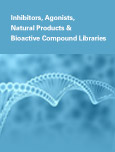Request The Product List ofc-Fms (CSF1R)
c-Fms (CSF1R)
Colony stimulating factor 1 receptor (CSF1R, c-Fms, CD115) is a tyrosine kinase transmembrane receptor for a cytokine called colony stimulating factor 1 (CSF-1). CSF-1R and its ligands, CSF-1 and interleukin 34 (IL-34), regulate the function and survival of tumor-associated macrophages, which are involved in tumorigenesis and in the suppression of antitumor immunity.
In solid tumors, targeting CSF-1R via either small molecules or antibodies has shown interesting results in vitro but limited antitumor activity in vivo. Blocking CSF-1/CSF-1R signaling represents a promising immunotherapy approach and several new potential combination therapies for future clinical testing.
PLX-3397 (pexidartinib) is an oral, potent, multi-target receptor tyrosine kinase inhibitor of CSF-1R, Kit, and Flt3 and is the most advanced selective CSF-1R inhibitor under clinical development. ABT-869 (linifanib) is an oral inhibitor of CSF-1R tyrosine kinase conducted a phase II trial in which ABT869 was administered to patients with hepatocellular carcinoma. BLZ-945 is another orally active, bioavailable, potent, and selective inhibitor of CSF-1R, which is currently being assessed in a first-in-man phase I/II study as a single agent or in combination with PDR-001 (anti-PD-1 antibody) in several advanced solid tumors. Besides, multiple anti-CSF-1R monoclonal antibodies have also entered clinical trials, including FPA-008 (cabiralizumab), RG-7155 (RO5509554), IMC-CS4 (LY3022855) and AMG-820.
The development of new CSF-1R/CSF-1 axis inhibitors represents an attractive method for managing patients with metastatic solid tumors refractory to the standards of care or with diffuse/relapsed TGCT. Recent clinical trials testing CSF-1R inhibitors as monotherapies have shown encouraging results in the management of PVNS but disappointing outcomes for the treatment of solid tumors.
References:
1. Peyraud F, et al. Curr Oncol Rep. 2017 Sep 5;19(11):70.
2. Pyonteck SM, et al. Nat Med. 2013 Oct;19(10):1264-72.
3. Kogan M, et al. Anticancer Res. 2012 Mar;32(3):893-9.
4. Albert DH, et al. Mol Cancer Ther. 2006 Apr;5(4):995-1006.













